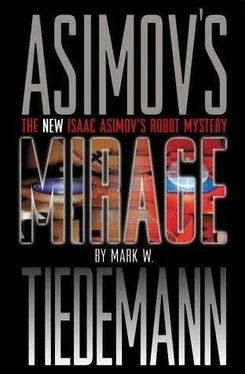Mark Tiedemann - Mirage
Здесь есть возможность читать онлайн «Mark Tiedemann - Mirage» весь текст электронной книги совершенно бесплатно (целиком полную версию без сокращений). В некоторых случаях можно слушать аудио, скачать через торрент в формате fb2 и присутствует краткое содержание. Год выпуска: 2000, ISBN: 2000, Издательство: IBooks, Жанр: Фантастика и фэнтези, на английском языке. Описание произведения, (предисловие) а так же отзывы посетителей доступны на портале библиотеки ЛибКат.
- Название:Mirage
- Автор:
- Издательство:IBooks
- Жанр:
- Год:2000
- ISBN:ISBN: 0-671-03910-5
- Рейтинг книги:5 / 5. Голосов: 1
-
Избранное:Добавить в избранное
- Отзывы:
-
Ваша оценка:
- 100
- 1
- 2
- 3
- 4
- 5
Mirage: краткое содержание, описание и аннотация
Предлагаем к чтению аннотацию, описание, краткое содержание или предисловие (зависит от того, что написал сам автор книги «Mirage»). Если вы не нашли необходимую информацию о книге — напишите в комментариях, мы постараемся отыскать её.
Mirage — читать онлайн бесплатно полную книгу (весь текст) целиком
Ниже представлен текст книги, разбитый по страницам. Система сохранения места последней прочитанной страницы, позволяет с удобством читать онлайн бесплатно книгу «Mirage», без необходимости каждый раз заново искать на чём Вы остановились. Поставьте закладку, и сможете в любой момент перейти на страницу, на которой закончили чтение.
Интервал:
Закладка:
"Forty-six seconds."
"What occurred during those forty-six seconds?"
Bogard hesitated. Mia waited, breathing shallowly.
"Humans were injured," Bogard stated simply.
"Detail."
"I-there is no detail. I have no record-"
"Stop. Run diagnostic."
"Global?"
"No, specifically on memory."
Bogard remained silent for a few seconds.
"All memory systems complete and operational."
"You register no gaps?"
"No."
Mia scowled, annoyed and a little frightened. "Bogard, there is a significant amount of detail you are not reporting. Review the time segment previously specified and analyze."
Silence. Then: "I show no discrepancy."
Mia started to tell Bogard, but its prior hesitation when confronted with only part of the information made her pause. She knew a little about what the roboticists called "positronic breakdown," but not enough. She lacked the expertise to examine Bogard any further, but the gap in Bogard's report disturbed her.
Bogard did not remember Senator Eliton dying. Should she tell it? What would happen to it if she forced it to confront the deaths of two humans it had attempted to protect? She remembered its near collapse in the hospital and, earlier, its apparent relief at having her override its priorities in Union Station. She simply did not know enough.
"Do you wish me to continue the report?" Bogard asked.
Mia started. "Oh. No, Bogard. That's enough tonight. I need sleep."
"I will be here."
"One more thing, Bogard. Can you identify the type of projectile weapons used?"
"Not at present. I have a reliable image and can do a database search and match."
"Good. Initiate search. Thank you."
"You are welcome."
She stared at Bogard until she could no longer stay awake. There were already too many questions to puzzle through and, she imagined, too little time. To have Bogard become one of those questions… too much, too soon.
Sleep was welcome. initiate internal diagnostic relevant to Interrogatory command, specify corrupted sequencing, analyze potential Third Law violation, buffer nodes P-Seven and P-Eight protect encrypted, access blocked, potential First and Second Law violation consequent upon internal override, external buffer protocol indicated, primary command protocol overriding necessity to access, recommend isolation of subject buffer nodes coded to command protocols for external release, data protected, data isolated, data held awaiting command protocol for download, request negated by Daventri Mia, delay consistent with self-preservation protocols and consistent with First and Second Law protocols, analysis of relevant systems complete, performance potential optimal end report
Ten
Derec found Rana asleep on the cot in the cafeteria, one arm draped over her eyes, the other hanging to the floor. He did not know how long ago she had given herself up to sleep, so he left her alone. He poured himself a coffee and returned to the main lab.
Details. He scrolled through the reports filed sometime in the early morning hours by his field techs.
Twenty-six of Union Station's robots had gone into complete positronic collapse-all those that had been present in the gallery when the shooting began. The rest seemed relatively unaffected, although complete diagnostics could not be finished due to the team's ejection from the site by Special Service.
A request for a tech to help an Acrisian with a domestic problem. One of her servors had evidently been given a conflicting command and sent it into a dilemma loop. She suspected one of the workers from D. C. urban maintenance had done it, though she could not prove it. She wanted her robot fixed and evidence to take to the local police when she filed a complaint.
Derec sighed. Robotic affidavits were not allowed in Terran courts; the police would, at best, take her report and then do nothing with it, humoring the Spacer. At worst, the robot would be confiscated as contraband. Positronic robots were allowed only in embassy areas and one or two other specially designated Spacer zones. How these people got humaniform positronic robots past customs baffled Derec. Nevertheless, he entered authorization to send a field tech to her residence, which was just outside the embassy district, on the coast. Acrisia's oceans nearly dwarfed Earth's, so it made sense to him that Acrisians would try to be near something homelike, but he still wished the Spacers would stick to their enclaves if they insisted on keeping robots.
He found a thank-you on his com from Agent Sathen for his help at the hospital, Sathen's personal com code appended. Derec filed that.
He was tempted to call more people in government to try to get past the Special Service restrictions, but the only one who might help would be Eliton's vice-senator-now Senator-Jonis Taprin, and Derec doubted he would be available yet, what with all the details Eliton's death must have dropped on him. Perhaps later, though he doubted it would do much good. Derec shuddered at the idea of untrained people teasing through the tatters of a positronic brain. He called his lawyer again, but the man was still in Chicago Sector.
He went to Rana's console and sat down.
Her screens displayed the bizarre patterns she had shown him the night before. He sat down and leaned on the console, tracing the mazelike coils. They still seemed familiar, though he could not identify them or recall the context. Rana was right -they ought to have had solid endpoints, clear resolutions, but they simply faded out like the paths of excited quarks on a particle analysis chart. The equivalent in human brains would be the degenerative pattern of a memory disorder or cognitive disfunction…
Derec sat up stiffly. No, there was a closer resemblance. He stared at the patterns now, almost unwilling to admit what he saw. He moved to another screen and accessed the specifications on Bogard. After sifting through a number of levels, he found what he wanted.
"Damn," he hissed.
" 'Morning," Rana said, stumbling into the room. She carried a cup of coffee.
"Take a look at this," Derec said, scooting back from the console to give her room.
Rana leaned toward the screen with Bogard's specs. She frowned. "What-?"
"Those are the pathway tracks for the temporal buffers we built into Bogard."
Rana looked back at the RI display on her own screens, then again at these patterns. "Damn."
"I thought those trails looked familiar," Derec said enthusiastically. He stood and clapped his hands. "I was exhausted last night-that's why I couldn't see it."
"They aren't identical."
Derec looked at the Bogard screen. The pathways that showed the track of positronic activity from one part of Bogard's system into another did not coil so tightly nor fade out in quite the same way. Instead, the loops and tangles doubled back on themselves a couple of times, then traced direct paths out of the main positronic matrix, through a clear demarcation point, ending sharply with the exit of the track.
"No," Derec conceded, "but the similarities are too great to deny."
Rana sat down. "But Bogard's a prototype. None of these specs are in any other database than our own."
Derec rose from his seat and shrugged. "Parallel research?"
"On whose part? The Union Station RI is a standard positronic brain, installed by the good people of the Calvin Institute. Part of the agreement for it was that it would be a conservative, basic model. And even if they knew about our upgrades, they'd think it was heresy and would have nothing to do with it." Rana glanced at her screen. "Besides, they aren't identical. Bogard's pathways don't just fade like this, they end. They have a destination and a gateway to it."
"Because they feed into a symbiotic system riding alongside the main one. There's only one place for the trace to go. There's access back and forth across the boundary, sure, but the way the trace is generated-"
Читать дальшеИнтервал:
Закладка:
Похожие книги на «Mirage»
Представляем Вашему вниманию похожие книги на «Mirage» списком для выбора. Мы отобрали схожую по названию и смыслу литературу в надежде предоставить читателям больше вариантов отыскать новые, интересные, ещё непрочитанные произведения.
Обсуждение, отзывы о книге «Mirage» и просто собственные мнения читателей. Оставьте ваши комментарии, напишите, что Вы думаете о произведении, его смысле или главных героях. Укажите что конкретно понравилось, а что нет, и почему Вы так считаете.












